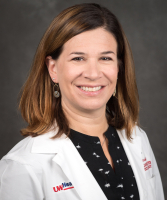Dr. Kari Wisinski and Dr. Mark Burkard explain how precision medicine helps treat cancer


Precision medicine has become a catchphrase in cancer treatment. The University of Wisconsin is planning the UW Center for Human Genomics and Precision Medicine, and the Wisconsin state government’s recently-passed budget includes funding for the UW Carbone Cancer Center’s statewide Precision Medicine Molecular Tumor Board.
Mark Burkard, MD, PhD (pictured at upper right), associate professor and Kari Wisinski, MD (pictured at lower right), associate professor (CHS), both of Hematology, Medical Oncology and Palliative Care, explained the concept of precision medicine in cancer treatment in an article on UWMadScience, a news outlet about science and research at the University of Wisconsin-Madison.
"Even in cancer types that originate in the same organ, there are many different diseases that are pretty unique," said Dr. Burkard. "What we’re hoping to do is identify those differences that may help explain clinically how a person’s tumor spreads and behaves, and then ultimately customize treatments."
Decreases in the cost of DNA sequencing technology have made it feasible to identify DNA mutations in tumor cells that drive uncontrollable growth.
"At the same time that we’ve learned to identify these abnormalities or mutations with sequencing panels, more drugs have been developed to target these specific abnormalities. Our hope is that these medications will stop the signaling that drives the growth of these cancers," said Dr. Wisinski.
Resources:
- "What is precision medicine in cancer treatment?," UWMadScience, September 25, 2017